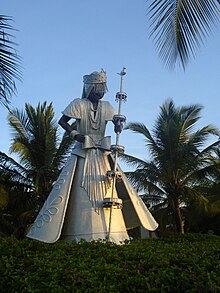Ọbatala
Yoruba
[edit]
Etymology
[edit]It likely originated as a title for the leader of the Mega-House Ìdèta, a polity of the ancient town of Ufẹ̀ during the 9th-11th centuries AD. One of these leaders during the 11th century AD later rose as the head of all the mega-houses in Ufẹ̀ and established the Ufẹ̀ confederacy, a precursor to the Ife kingdom, and served as the chief priest of the deity Ọ̀ràm̀fẹ̀. It was this specific "Ọbàtálá" that became deified as the divinity Òrìṣà (Òrìṣàńlá). The term matches similar structures with titles of chiefs and legendary figures who likely lived as fellow Mega-house leaders and chiefs during that period, such as Ọbalálẹ̀, the head of the Ìlálẹ̀ house, Ọbalésùn, the head of the Ìlésùn house, and Ọbalíá, the head of the Ìlià house. They served as chiefs under the political leadership of the Ọbàtálá, the ruler of the Ìdèta house that encompassed these three minor houses.
The first part of the term comes from ọba (“king, father”), and the concluding syllable likely coming from lá (“to be big”), thus likely originating from may come from the phrase ọba Ìdèta lá (“The mighty king of Ìdèta”)
Pronunciation
[edit]Proper noun
[edit]Ọbàtálá
- the title of the leader of the ancient Ufẹ̀ mega-house polity, Ìdèta. One of these leaders was later made king of the Ufẹ̀ confederacy of houses and deified as the deity Ọbàtálá
- Ọbatala, a powerful irúnmọlẹ̀ and divinity of creation, the sky, heaven, purity, the creator of the Earth (beginning with the town of Ufẹ̀). He is the oldest of the orisha, with the term orisha originally referring to him. He is the husband of the orisha Yemòwó (Mawu in other West African religions).
- He is often associated with purity, relating to the symbols of ẹfun (“white chalk”) and àlà (“white cloth”).
- Synonyms: Òrìṣà, Òrìṣàálá, Òrìṣà-ìkirè, Ọba Bárúgbó, Òrìṣà-gbìngbìnki, Òrìṣà Pópó